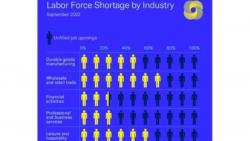As the above US Chamber of Commerce chart demonstrates there are a large number of open positions across industries. At the same time, the industry unemployment rates are at 2-3% except for Hospitality which is at 5%.(1) The Workforce Participation Rate peaked in 2000 at 67.3%. In November 2022 it had fallen to 62.1%. Therefore, in the last 20 years we have lost 5% of our workforce.(2)
We have also lost a large number of our workforce to non-traditional jobs. This would include home delivery, off-site 1099 remote work and alternative retail establishments. Lastly, the retirement rate has doubled in the last two years compared to 2008-2019.(3)
The conclusion is obvious, the labor shortage will continue for some time. What can you do about it?
First – stop the bleeding
If you are like my typical client, employee turnover cost increased in 2022 compared to 2021. The recruiting costs, training costs, on boarding, loss of productivity along with everything else in many cases can dwarf your net bottom line. A major part of the “everything else” is a reputation in the workforce as having a major employee turnover problem. People do not want to work in that type of environment and will steer far from you. With the current labor shortage continuing indefinitely, the benefits of reducing employee turnover will skyrocket. The costs of continued employee turnover will also increase.
What are your missed opportunity profits due to an unstable workforce?
Many companies want to grow; but, their employee base cannot even adequately support current operations. Growth cannot occur until the workforce is able to support it consistently. Eliminating employee turnover and demonstrating the ability to recruit are the first two steps to growth.
Is this the year you decide to take control of your workforce by identifying and managing the root causes of your employee turnover? The first step is to come to grips with the actual annual cost. This can only be done by calculating the average cost over at least two years. I recommend three or four which will also show a trend. The trend will almost always be toward more cost each year. You also need to identify some of the preliminary root causes of your turnover. Lastly, you need to categorize the strategic and tactical options which will lead to control of your workforce.
1. US Chamber of Commerce
2. US Bureau of Labor Statistics
3. Pew Research

